- Home
- Catherine Jinks
Pagan's Scribe
Pagan's Scribe Read online
THE PAGAN CHRONICLES
‘Full of the richly-textured, high-smelling, highly individualistic atmosphere of the Middle Ages, Catherine Jinks’s Pagan series offers unforgettable characters in an extraordinary setting and time, presented in crisp, pungent prose.’
SOPHIE MASSON
‘Humour, romance, adventure, violence – who would have thought Medieval Jerusalem could be so much fun?’
LILI WILKINSON
‘The Pagan Chronicles are a kind ‘ of medieval version of Tin Tin, meticulously researched and told with a delightfully slapstick, cinematographic vigour.’
URSULA DUBOSARSKY
‘What a romp! Not since Don ‘ Quixote took up with Sancho Panza has a knight had a squire like Pagan Kidrouk.’
Voice of Youth Advocates
‘There have been few characters in recent historical fiction more vibrant than the street-smart, fast-talking protagonist of this series.’
School Library Journal
‘Rich, vivid storytelling, with a sturdy ‘ base in historical events, and undercurrents both comic and serious.’
Kirkus Reviews (STARRED REVIEW)
‘Jinks dramatically evokes a historical ‘ time that was particularly dark and dirty æ Along with the drama and darkness, readers will find intensity and, yes, humor. Series fans may find other books set in the Middle Ages pallid after this one.’
AMERICAN LIBRARY ASSOCIATION
‘Pagan is a real, live boy who leaps off ‘ the page and compels you to listen to his story.’
KIRSTY MURRAY
‘Humour? Rage? Agony? Spiritual ‘ journeys? Murder? Moral turpitude? Twists both welcome and dismaying? This decidedly unique historical saga has it all.’
Kirkus Reviews (STARRED REVIEW)
‘Brimming with wit and fascinating ‘ details of medieval history, with its vividly drawn characters æ this emotionally satisfying epic brings the Middle Ages to life.’
The Horn Book
CATHERINE JINKS is a scholar of medieval history and a prolific author for teenagers, children and adults. Her books have been published to wide acclaim in Australia and overseas and have won numerous awards. She loves reading, history, films, TV and gossip, and says she could write for eight hours straight every day if she had the chance. Catherine lives in the Blue Mountains of NSW with her husband and daughter.
www.catherinejinks.com
THE PAGAN CHRONICLES
Pagan’s Crusade
(shortlisted CBCA and Victorian Premier’s Literary awards)
Pagan in Exile
Pagan’s Vows
(winner CBCA Book of the Year Award for older readers)
Pagan’s Scribe
(winner Victorian Premier’s Literary Award for children’s literature)
Pagan’s Daughter
(notable book CBCA Book of the Year Award for older readers)
Pagan’
Scribe
Catherine
JINKS
The author would like to thank John O. Ward for his assistance.
First published in 1996
This edition published in 2007
Copyright © Catherine Jinks, 1996
All rights reserved. No part of this book may be reproduced or transmitted in any form or by any means, electronic or mechanical, including photocopying, recording or by any information storage and retrieval system, without prior permission in writing from the publisher. The Australian Copyright Act 1968 (the Act) allows a maximum of one chapter or ten per cent of this book, whichever is the greater, to be photocopied by any educational institution for its educational purposes provided that the educational institution (or body that administers it) has given a remuneration notice to Copyright Agency Limited (CAL) under the Act.
Allen & Unwin
83 Alexander St
Crows Nest NSW 2065
Australia
Phone: (61 2) 8425 0100
Fax: (61 2) 9906 2218
Email: [email protected]
Web: www.allenandunwin.com
National Library of Australia
Cataloguing-in-Publication entry:
Jinks, Catherine, 1963–.
Pagan’s scribe.
For ages 12 and over.
ISBN 978 1 74175 234 2.
1. Crusades – Juvenile fiction. 2. Carcassone (France) – History – 13th century – Juvenile fiction. 3. France – History – Philip II Augustus, 1180–1223 – Juvenile fiction.
I. Title. (Series: Jinks, Catherine, 1963– Pagan chronicles; 4).
A823.3
Cover & Text Design by Zoë Sadokierski
Set in Celestia Antiqua 11.5/15pt by Midland Typesetters
Printed in Australia by McPherson’s Printing Group
10 9 8 7 6 5 4 3 2 1
To Margaret Connolly, for her endless support
Contents
Chapter 1 14 July 1209
Chapter 2 14 July 1209
Chapter 3 14 July 1209
Chapter 4 14 July 1209
Chapter 5 14 July 1209
Chapter 6 15 July 1209
Chapter 7 15 July 1209
Chapter 8 15 July 1209
Chapter 9 16 July 1209
Chapter 10 16 July 1209
Chapter 11 17 July 1209
Chapter 12 17 July 1209
Chapter 13 18 July 1209
Chapter 14 20 July 1209
Chapter 15 July 1209
Chapter 16 21 July 1209
Chapter 17 22 July 1209
Chapter 18 24 July 1209
Chapter 19 25 July 1209
Chapter 20 28 July 1209
Chapter 21 2 August 1209
Chapter 22 3 August 1209
Chapter 23 8 August 1209
Chapter 24 10 August 1209
Chapter 25 11 August 1209
Chapter 26 11 August 1209
Chapter 27 19 August 1209
Chapter 28 19 August 1209
Chapter 29 19 August 1209
Chapter 30 19 August 1209
Epilogue
Chapter 1
14 July 1209
Hear my cry, O God; attend unto my prayer.
Lord, I’m sitting here like a pelican in the wilderness. Like an owl in the desert, Lord. Is it truly your divine wish that I should spend the rest of my life in this miserable village? In this howling wasteland? Did you look at this dungheap and say: That’s where I’m going to send Isidore, so he can eat the bread of sorrow? Because that’s what I’ve been doing, Lord, ever since I arrived. I’ve been eating the bread of sorrow and licking the dust like a serpent.
Lord, it may have escaped your notice, but the nearest manuscript is a full day’s ride from here. A full day’s ride. Surely you must understand what it’s like for me, if I don’t have any books? It’s worse than not having any food or water. I can’t live without books, Lord, you must know that. And the people here are so stupid: their heads are as empty as pots. And just look at this church I’m sitting in! Have you ever seen such a horrible church? Have you ever seen such horrible paintings? Look at that painting on the apse: that one of the four-and-twenty elders, with their white raiment and their crowns of gold. Do they remind you of anything? Of four-and-twenty poached eggs, perhaps? And do you see the way Our Lord Jesus Christ seems to be sticking his finger up the nose of that angel? It’s blasphemous, Lord, it really is. Whoever painted it ought to be crucified.
Father, did you create Merioc just to punish me for my sins? Because if you did, it’s the perfect penance. I hate this village, and everyone in it. I hate the way they’re all married to their cousins. I hate the way they’re all named Bernard. I hate the gossip, and the lice, and the sticky, smelly cheese they produce here. I especially hate the shepherds’ bagpipes – have you h
eard those bagpipes, Lord? But of course you have. They’re loud enough to drown the Last Trump, so you must have heard them in heaven.
O Lord, I know I’m a sinner. I know I have a devil in me, but I’m trying very hard to get rid of it. Can’t you please punish me in some other way? If I don’t get out of here soon, Lord, I think I’ll go mad.
‘Hello?’ A man’s voice, echoing around the church like the sound of bells. ‘Hello? Is the priest here?’ Who can this be, marching onto consecrated soil as if he owns it? He stands there framed by the western door, dark against the light, and I can’t really see him from this distance. But he moves forward, and it’s obvious at once that he’s not from the village: no villager walks like that, so briskly, with such a firm tread. All the villagers ever do is amble, like cows. He’s peering into the dimness, and of course he sees me, because my white surplice gleams in the shadows like a wolf’s eyes.
‘Who’s that?’ he says. ‘Are you the priest?’
‘No, I’m the parish clerk –’
‘Where is the priest?’ He’s small and wiry, with thick black hair and a neatly trimmed beard. He also has a tonsure. I can see it, now, on the crown of his head – that distinctive, circular, shaven patch of scalp.
So he’s a cleric, then. How interesting.
‘Where is the priest?’ he snaps. ‘Have you lost your tongue? I just asked you a question!’
‘The priest is at a deathbed, Father.’
‘Sweet saints preserve us.’ He stamps his left foot. (What a restless little man he is.) ‘That’s typical,’ he rages. ‘That’s all I need. What’s your name, boy?’
‘Isidore.’
‘Isidore? Good. Then you can come here, Isidore, because I need your help.’
Come here, Isidore. Go there, Isidore. I’m like stubble before the wind, in this place. Ah well. Better it is to be of humble spirit with the lowly, than to divide the spoil with the proud.
And speaking of the proud, this little man is no parish priest. Out in the sunlight, it’s possible to see how supple and expensive his boots are. He’s not wearing any jewellery, but his black robes are glossy and full, finely woven and finely stitched, like the feast-day vestments back in Pamiers. And look at his horses! At least, I assume they’re his horses. None of the locals can flaunt a pair of beasts like those. In fact no one in this village owns any horses at all.
Perhaps that’s why these two have drawn such a big crowd. At least half-a-dozen staring peasants have gathered near the church steps, wary but fascinated: the usual crew of eaves droppers, including Bernard Lagleize and Bernard Belot and Bernard Lagleize the Younger, chewing like cows, spitting and scratching and picking their noses. When they see the little man beside me they cross themselves, because he has very dark skin – strange, dusky skin – and these people are so dense, so incredibly insular, that they’re frightened by anything out of the ordinary. Witness the way they behaved when I first showed up. Anyone would think that red hair was a mark of the Devil.
‘Look! Just look at him!’ The little man points at one of his horses: there’s a hunched figure on top of it. ‘See that steaming heap of garbage over there? That used to be my scribe. He’s not fit to travel, because he’s evacuating continuously from both ends. That’s what happens when you’re a greedy pig, and eat bad fruit against the advice of your elders. Where’s the priest’s house, Isidore? I’ll have to put this idiot to bed.’
The priest’s house? Oh no. I can’t invite you into the priest’s house, little man. The priest’s house belongs to the priest.
‘It’s all right.’ He’s looking at me, squinting in the harsh noonday glare. ‘My name is Father Pagan,’ he says. ‘I am the Archdeacon of Carcassonne. If your priest objects, he’ll have me to answer to. Now, where does he live?’
‘Over there.’ Pointing. ‘Around the corner.’
‘Good. Let’s go, then. You can lead that horse, and I’ll lead this one.’
Lead the horse? But I don’t know anything about horses. What am I supposed to do with it? What if it bites me? Just look at its great yellow eye, rolling like the stone of Sisyphus. Just look at its great yellow teeth.
‘Go on, she won’t hurt you.’ The Archdeacon has seized the reins of his scribe’s mount, right up under its bristly chin. But when I try to do the same for mine, it snorts, and tosses its head.
Help! This animal doesn’t like me. Somewhere in the crowd, someone laughs: the village square seems to be full of mangy peasants, all waiting for me to make a fool of myself. God curse them. May their increase be given unto the caterpillar, and their labour unto the locust.
‘Come.’ The Archdeacon crooks a finger. ‘I’ll give you these reins, and I’ll take yours. There. All right, now? Just pull him along gently, and you won’t have any trouble.’
Gently. Pull gently. One little tug, and the horse starts to move: I can feel its hot breath on my wrist. The scribe moans with every step it takes; he’s curled up in the saddle, his greenish face pillowed against his mount’s neck. He wears a canon’s robe and a tonsure.
‘Julien!’ The Archdeacon speaks from behind me. ‘I warn you, Julien, if you dare throw up on my beautiful horse, you’ll be licking the mess off, understand?’
But there’s no response from Julien. The crowd follows us around the side of the church, towards the little mud-brick dwelling propped up against its southern wall. Ernoul is standing on the threshold, open-mouthed and pop-eyed: with his skinny frame and spiky hair, he looks exactly like a broom.
‘Who’s that?’ the Archdeacon enquires. ‘Does that fellow belong to the priest?’
‘Yes, Father, he’s our servant.’
‘Good. Then he can hold the horses. You, there! Fellow! Come and hold these horses! And you – Isidore – you can help me with Julien.’
Julien certainly needs some help. One small nudge and he tumbles down like an autumn leaf, emitting the most monstrous fart in the history of the civilised world. It puts me in mind of a bison’s fart, which (as everyone knows) sets fire to every tree within three acres.
‘God preserve us!’ the Archdeacon exclaims, staggering under Julien’s unwieldy tangle of limbs. ‘You smell like a leper’s latrine, you dung-bag!’
‘I’m going to be sick,’ Julien sighs. But the Archdeacon won’t have that. He sticks one small brown finger into Julien’s heaving breastbone. ‘No, Julien,’ he snarls, ‘I’m the one who’s going to be sick. You’re going to be sorry. Now stand up and stop whining. Come on, Isidore, take his other arm.’
It seems a very long way to Father Fulbert’s kitchen. Julien doesn’t have the strength to put one foot in front of the other, so it’s a matter of dragging him, step by step, through the front door. And here to welcome us is the mountainous Mengarde, displaying her toothless gums in sheer astonishment. Her hands are covered in flour.
‘Mengarde, this is the Archdeacon of Carcassonne, and this is his scribe Julien. Julien is feeling sick –’
As if to demonstrate, Julien suddenly erupts. A spray of vomit hits the earthen floor in front of us, and the smell of old bacon fat is overlaid by an even nastier smell. Mengarde jumps backwards.
By the blood of the Lamb of God, this is disgusting.
‘Julien,’ says the Archdeacon, through his teeth, ‘you are without doubt the most obnoxious individual ever to impose on my good nature. I’m finished with you.’
‘What do you want?’ Mengarde’s high, quavering voice. ‘What are you doing?’
‘We’re putting this man to bed.’ (So kindly get out of the way, old woman.) ‘You must take care of him.’
‘I?’ She raises her hands in protest. But the Archdeacon is looking around: at the low, smoky rafters, hung with hams and garlic; at the greasy table and benches; at the hearth and the woodpile and the baby pig, asleep in one corner. ‘Where shall we dump this useless sack of swill?’ he demands. ‘Through there, do you think? What’s through that door?’
That door? ‘That is the priest’s room, Father
.’
‘Oh.’ He frowns. ‘And where do your guests usually sleep, Isidore?’
‘They sleep in my bed.’
‘Which is where?’
Which is over there, beside that barrel. He peers as I point, noting the grimy old sheepskin on top of the lumpy straw palliasse. He seems surprised. ‘I see,’ he says. ‘And where do you sleep when your bed is occupied?’
‘On the table, Father.’
‘Hmmm.’
Julien is making ominous noises again. I can feel his shudders, and the sweat soaking through his clothes. The Archdeacon turns to Mengarde.
‘Get a bucket!’ he snaps.
‘But –’
‘Get a bucket! Or would you prefer to clean up some more mess?’ Whereupon Mengarde begins to waddle around frantically, wailing and whimpering, because all her buckets are full. She’s fat and slow-witted, and she keeps bumping into things.
She makes me think of a big, stupid cow on the loose in a marketplace.
‘Oh no you don’t,’ the Archdeacon splutters, as Julien gags. ‘Come on Isidore, we’ll put him on the table; I don’t want him soiling your bedclothes. By rights he should be out with the pigs – he doesn’t deserve anything better. Shut up, Julien, I’m not talking to you.’ He leads the way across the floor, and almost throws his scribe onto the tabletop. (For such a small man, he’s remarkably strong.) ‘Incidentally, Julien, if you think I’m going to wait around here, cleaning up your vomit and wiping your loathsome spotty behind, you can think again,’ he says. ‘I have far more important things to do. And I’m also in a hurry. Isidore? I want a word.’
With me? But why? I’m just the parish clerk – I’m as lowly as the chaff on the summer threshing floors. There’s nothing I can do for anyone. Nevertheless, he grabs my arm and pushes me through the door, back into the sunshine, away from the sick-room smells of the kitchen. Out here the air is fresher, though not much, because of the dungheap along the side of the house. And of course there’s the pungent fragrance of our delightful neighbours, who are still hovering about, discussing the new arrival and looking for all the world like hens at a trough. They fall silent when we make our appearance.

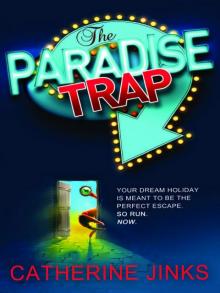 The Paradise Trap
The Paradise Trap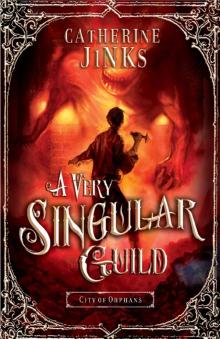 A Very Singular Guild
A Very Singular Guild Eloise
Eloise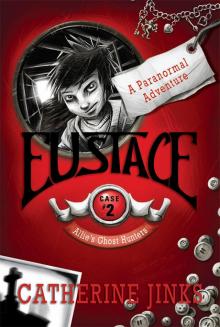 Eustace
Eustace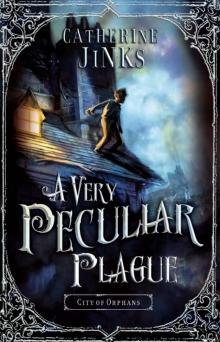 A Very Peculiar Plague
A Very Peculiar Plague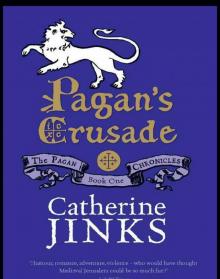 Pagan's Crusade
Pagan's Crusade The Gentleman's Garden
The Gentleman's Garden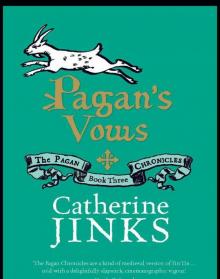 Pagan's Vows
Pagan's Vows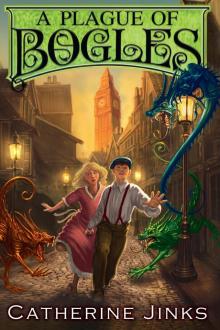 A Plague of Bogles
A Plague of Bogles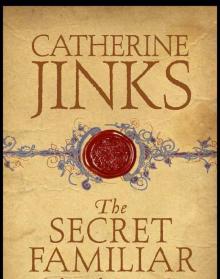 The Secret Familiar
The Secret Familiar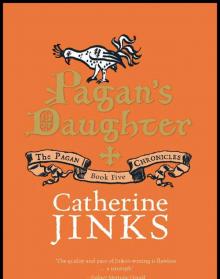 Pagan's Daughter
Pagan's Daughter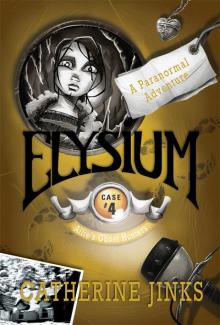 Elysium
Elysium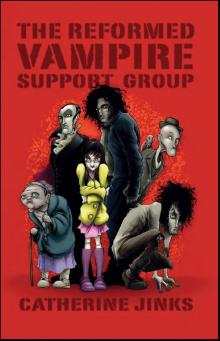 The Reformed Vampire Support Group
The Reformed Vampire Support Group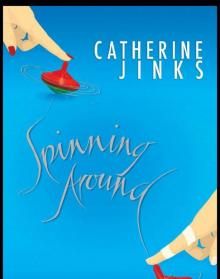 Spinning Around
Spinning Around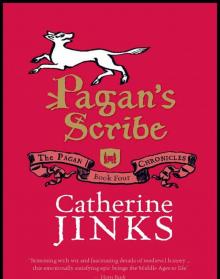 Pagan's Scribe
Pagan's Scribe Evil Genius
Evil Genius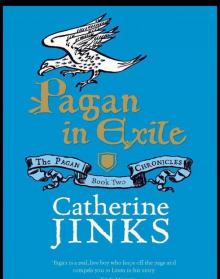 Pagan in Exile
Pagan in Exile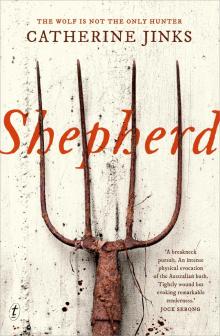 Shepherd
Shepherd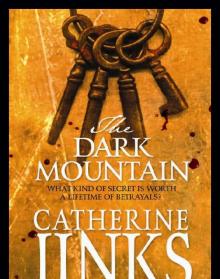 The Dark Mountain
The Dark Mountain How to Catch a Bogle
How to Catch a Bogle Saving Thanehaven
Saving Thanehaven The Genius Wars
The Genius Wars The Abused Werewolf Rescue Group
The Abused Werewolf Rescue Group Theophilus Grey and the Traitor's Mask
Theophilus Grey and the Traitor's Mask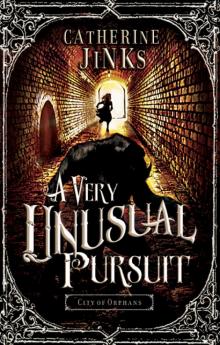 A Very Unusual Pursuit
A Very Unusual Pursuit Genius Squad
Genius Squad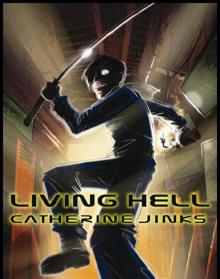 Living Hell
Living Hell The Road
The Road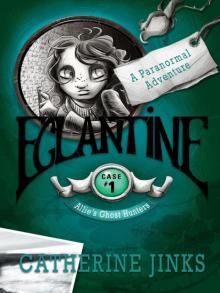 Eglantine
Eglantine